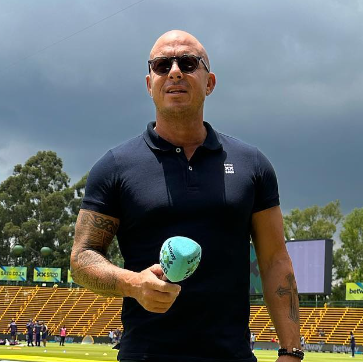South African cricket finds itself at a crossroads. Herschelle Gibbs’ critique of Rob Walter highlights issues that require immediate attention, from coaching strategies to player selection
While Walter’s tenure has seen highs, like the T20 World Cup final, the lows in bilateral series cannot be ignored.
The Proteas must strike a balance between addressing immediate concerns and building a sustainable structure for future success.
Whether that involves a change in leadership or a recalibration of strategies, one thing is certain: the road ahead will define the legacy of this team and its coach.
Also Read: Ashish Nehra (Cricketer): Bio, Career, Coaching, Mentorship, Private Life, Net Worth 2024 and More
Table of Contents
Herschelle Gibbs: Rob Walter’s Position as South Africa’s White-Ball Coach
Former South African cricketer Herschelle Gibbs has voiced sharp criticism of Rob Walter’s tenure as the national team’s white-ball coach.1
Following a disappointing T20I series loss to India, Gibbs expressed concerns about the team’s lack of improvement under Walter, despite their remarkable run to the T20 World Cup final earlier this year.
Below, we delve into the key areas Gibbs highlighted and the broader implications for South African cricket.
Despite leading South Africa to the T20 World Cup final in 2024, Walter’s record in bilateral series has raised eyebrows.
The team has lost five out of the last seven T20I series under his leadership, including a 3-1 drubbing by India.
Heavy defeats in Durban and Johannesburg underlined the gaps in South Africa’s strategies and execution.
Adding to these concerns is a lackluster 1-1 draw against Ireland earlier this year. While South Africa has demonstrated its potential in tournaments, their bilateral performances suggest inconsistency and vulnerability.
#BabarAzam𓃵
Babar Azam having 371 runs at Gaddafi Stadium in T20Is , most by any batsman at Gaddafi alongside Ahmed Shehzad having 261 runs (2nd most).
Weldone Dear @babarazam258 #SachinTendulkar#BabarAzam𓃵
Treat to Watch pic.twitter.com/ZOAO0efAXX— Herchelle Gibbs (@HershubyGibbs) April 11, 2022
One-Dimensional Bowling: A Lack of Plan B
A key issue raised by Gibbs is South Africa’s predictable bowling strategy. He lamented the absence of adaptability, pointing out that the Proteas often bring yorkers into play too late in matches. Comparing their approach to Australia, Gibbs remarked:
“Australia use the yorker early rather than a late option. But we refuse to do that.”
This rigidity in strategy has made South Africa’s bowling predictable and easier for opponents to counter, particularly in high-pressure situations.
South Africa’s top order also came under scrutiny, with Gibbs questioning the suitability of Reeza Hendricks in the powerplay.
While Hendricks has been a reliable player for the Proteas in the past, his limitations in accelerating during the early overs have been a recurring concern.
Similarly, Aiden Markram’s form has been worrying. His scores of 8, 3, 29, and 8 against India indicate a lack of consistency and inability to convert starts into substantial contributions. Gibbs suggested it might be time to consider fresh faces in the top order to reinvigorate the batting lineup.

Herschelle Gibbs: Mixed Signals
Success in Tournaments vs. Bilateral Struggles
Walter’s tenure has been marked by a curious dichotomy: success in global tournaments but struggles in bilateral series.2
Leading South Africa to the T20 World Cup final was a significant achievement, but their performances in series like those against India and Ireland suggest deeper structural issues.
This inconsistency raises questions about the team’s preparation and mindset. Are they over-reliant on specific conditions or players? Do they struggle to adapt to varying scenarios?
The Call for Leadership Change
Gibbs did not mince words in suggesting that Walter’s time as coach might be nearing its end. He pointed out that in other cricketing nations, a similar record might have already led to a change in leadership:
“Walter’s departure must be close. In other countries, the axe would have already fallen.”
Such comments reflect the growing frustration among former players and fans, who feel South Africa’s immense potential is not being fully realized under the current coaching setup.

Herschelle Gibbs: Structural Challenges in South African Cricket
Beyond individual performances and coaching strategies, the Proteas face systemic challenges.3
A lack of depth in the domestic circuit, coupled with the exodus of players to lucrative T20 leagues worldwide, has weakened the pipeline of talent.
Moreover, the pressure to perform amidst intense public and media scrutiny often leads to reactive decisions rather than long-term planning. Addressing these structural issues will be crucial for South Africa’s resurgence.
While the bilateral series losses have been disappointing, Walter’s ability to guide South Africa to the T20 World Cup final cannot be overlooked. The tournament showcased the team’s ability to perform under pressure and compete against the best.
However, the question remains: can the Proteas translate such performances into consistent success across all formats and series?
The Way Forward: Solutions and Recommendations
South Africa needs to adopt a more flexible and innovative approach to bowling. Introducing yorkers earlier in the innings, experimenting with variations, and focusing on tactical adaptability can help counter opposition strategies.
Considering younger or more aggressive players for the top order could address the batting struggles in the powerplay. Developing a backup for Aiden Markram and Reeza Hendricks is critical to ensure depth and competition within the squad.
The Proteas’ inconsistency often stems from mental lapses under pressure. Investing in sports psychologists and creating a robust support system for players can enhance their ability to handle high-pressure situations.
Strengthening the domestic circuit and ensuring a steady flow of talent is essential for long-term success.
Encouraging players to stay within the system rather than pursuing overseas leagues will also be pivotal.

Also Read: Rachin Ravindra’s Journey Back to Bengaluru: A Special Moment in His Cricket Career
Also Read: Tom Latham (Cricket): Bio, Wiki, Career, Family, Relationship And More Explained






